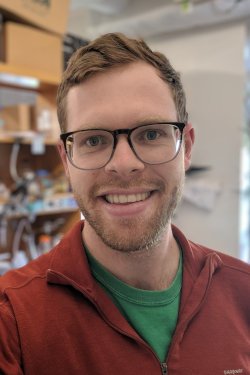Andrew Bridges
2022 Regional Award Finalist — Post-Doc

Current Position:
Assistant Professor
Institution:
Carnegie Mellon University (previously, Princeton University)
Discipline:
Microbiology

Current Position:
Assistant Professor
Institution:
Carnegie Mellon University (previously, Princeton University)
Discipline:
Microbiology
Recognized for: Pioneering studies on the lifecycles of bacterial biofilms. Biofilms are surface-attached, multicellular communities of bacteria that offer protection from antimicrobials and assist in the transmission of bacterial diseases. Microbiologist Andrew Bridges, PhD, pioneered a novel microscopy assay whereby he can visualize, in real-time, the biofilm lifecycle of V. cholerae, the bacteria that causes the global disease, cholera. He focuses on the understudied dispersal phase of the biofilm lifecycle whereby cells exit the biofilm to start another one. By incorporating molecular and genetic techniques, Bridges identified three important steps that drive V. cholerae biofilm dispersal. These steps include signal transduction via a previously uncharacterized molecular signaling pathway, digestion of the components that hold cells together in the biofilms, and finally, bacterial locomotion. Bridges’ discoveries could lead to new strategies to control biofilm dispersal with the potential to halt the spread of disease.
Areas of Research Interest and Expertise: Microbiology, Biofilm Development and Dispersal, Quorum Sensing, Vibrio cholerae
Previous Positions:
BS, Appalachian State University
PhD, Dartmouth College (Dr. Amy S. Gladfelter)
Postdoctoral Fellow, Princeton University (Dr. Bonnie L. Bassler)
Research Summary
Bacteria commonly resist threats by forming multicellular structures known as biofilms. The biofilm state is initiated when bacteria attach to surfaces and collectively produce an extracellular matrix–a network of molecules that provide structural and biochemical support between each bacterium. Biofilms offer bacteria protection from perils such as antimicrobial compounds and predation–and are therefore tremendously problematic as they are notoriously difficult to disrupt in the clinic. Microbiologist Andrew Bridges, PhD, is investigating the mechanism of biofilm dispersal, the stage of the bacterial life cycle whereby cells depart from their current biofilm home, disseminate to new territories, and found new communities.
Since little is known about the dispersal stage of the biofilm life cycle, it was necessary for Bridges to develop an approach capable of observing this phenomenon. His novel, real-time imaging assay measures the Vibrio cholerae biofilm lifecycle from formation through dispersal, which is the period of the bacteria’s lifecycle that is considered critical for the transmission of cholera. By combining his imaging methods with molecular and genetic techniques, he revealed three components necessary for biofilm dispersal: molecular signaling, extracellular matrix degradation, and bacterial motility. Bridges discovered a previously uncharacterized gene, which he named “Dispersal of Biofilm Sensor,” which aids in the dispersal process. The degradation of the extracellular matrix is critical for dispersal, and Bridges found that when V. cholerae detects related species (“kin”), bacteria remain in the biofilm state; however, when it detects cues from other “non-kin” species, V. cholerae disperses from biofilms. These discoveries will help to pioneer new ways to control dispersal to prevent the spread of biofilms.
Receiving this honor is a tribute to the wonderful mentors who have guided me in my training. A major theme of my independent career will be to create an engaging and immersive intellectual atmosphere for trainees, as my mentors have done for me.
Key Publications:
Other Honors:
| 2021 | Damon Runyon-Dale F. Frey Award for Breakthrough Scientists, Damon Runyon Cancer Research Foundation |
| 2021 | Annual Postdoctoral Award for Achieving Great Science, Princeton University |
| 2017-2021 | HHMI Fellow, Damon Runyon Cancer Research Foundation |